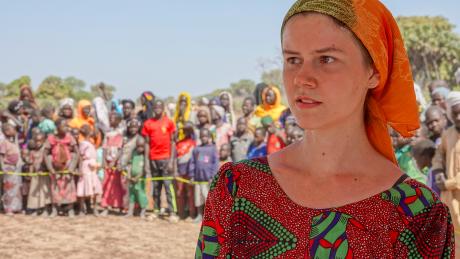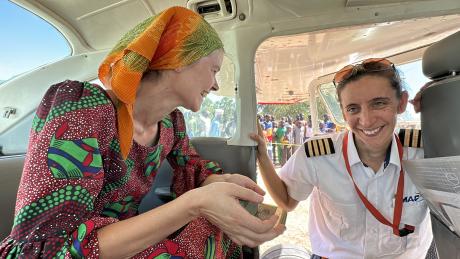
After experiencing the 14-hour drive to her remote community, Deborah says flying with MAF helps her to be much more effective
Deborah is about to board the MAF plane, she is surrounded by people in a little village in Chad, a group speaking a local language that she has been working with the past few months.
The pilot, Becki Dillingham will take her to Ndjamena the capital of Chad, but soon Deborah will be back to continue her work.

Deborah from Switzerland is working for SIL, with a minority language doing grammar work. She explains the importance for children and women as well as men to learn to read because the literacy rates are very low compared to other countries.
“One big problem here is that the school is in French and the children at home, they don't speak French, they speak their own language,” she says.
“They come to school, they don't understand French and try to learn in a language you don't understand. That's impossible.”
This leads to a high dropout rate in school in this area, which Deborah wants to address.
“One project is to start doing school in both languages in their language and French, so they can ease in, and they can get more out of school.”
It is the second time that Deborah will be on this kind of plane, and she is excited for
the opportunity to travel with MAF. “I lose a lot less time out of my work, I just lose half a day instead of four days,” she says.
“I did the trip by road several times, and it just stressed me out so much. I'll do it again one day, but it just helps my stress levels to be able to fly this time. And you can do work instead.”
The first time Deborah travelled to the isolated region; she went by car.
“Oh, my word, tell me about it. It was a 14-hour journey,” she recalls. "Once we did it in one day, which was long. And once we split it up in four days. I did some of the driving as well, which was fun, challenging, but fun.
“You meet goats and cattle herds and women travelling with their donkeys and children, and you have to constantly scan the road for holes! That was interesting.”
Deborah works with the local community to develop a detailed understanding of the language.
“First I'll just be at language learning. And then after that we'll be analysing the grammar of the language we're working with, not on my own, because I'll never learn the language as well as a mother tongue speaker, because it's their language. But I have the linguistic training to help them to do that,” she explains.
“And that will take us till mid-2025. And then my time here will be finished. It's a bit of a nerdy job! I'm just here for a relatively short time to support the team. And then I'll be heading back home and do the second part of a training that I did for here.
“This is like in between two parts of training. It will be a master's degree in the end, in language, community, and development.”
Deborah says that the people in the community are very friendly.
“Lots of the work is just everyday life. We check in on our neighbours. Visiting people, just sharing life really. And then a part of it is also the official work,” she adds.
“Yesterday, I wasn't very well. We have a watchman for our compound. He went out to the market to get me the right medication and came back and explained how I need to take it and made sure I knew everything and came in to check on me a couple of times here.
I want to be living with people and connecting with people.